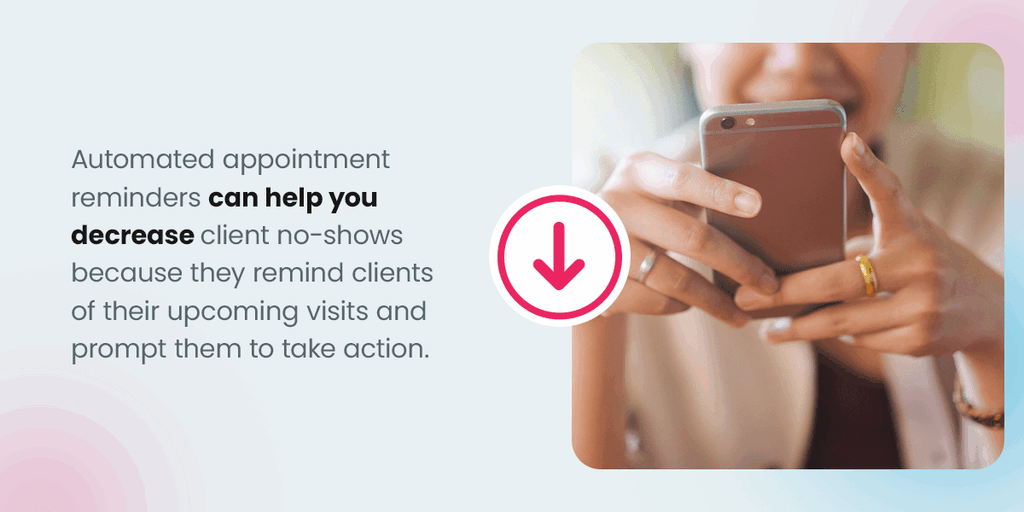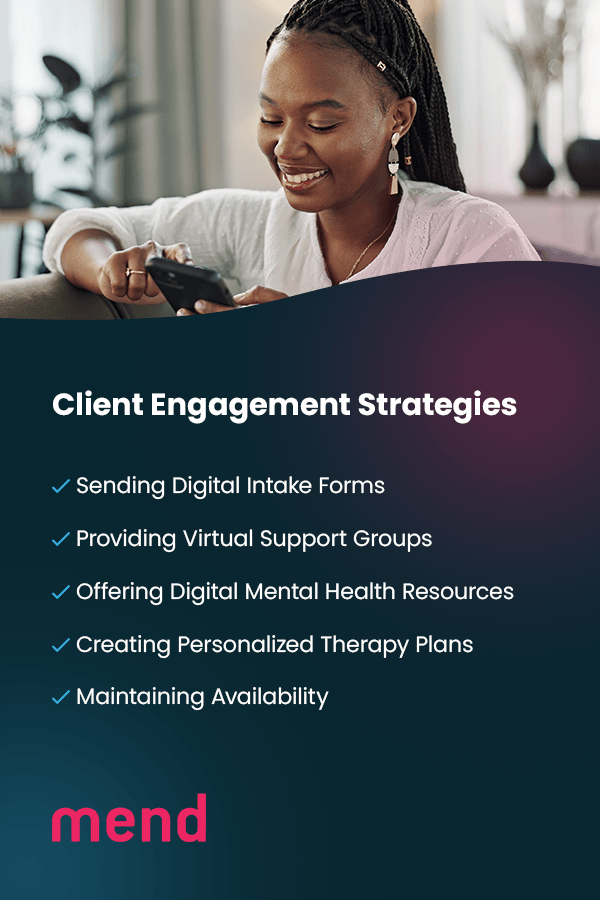Mental Health KPIs
Tracking the right key performance indicators (KPIs) is essential for delivering the best mental health services to your clients. The effectiveness of mental healthcare primarily depends on how accessible it is and how well therapy providers can keep clients engaged in their treatment plans. Virtual and hybrid care solutions such as telehealth services are making therapy more available and easier to access, and it’s important to measure specific mental health KPIs in this new digital landscape.
What Are KPIs for Mental Healthcare Providers?
KPIs are metrics professionals can use to measure mental healthcare provider performance. With the right KPIs, you can gauge various aspects of therapy delivery and performance. These metrics capture and translate vital information for the success of any mental healthcare provider.
Common mental healthcare KPIs are:
- Therapy session attendance rates.
- Treatment plan effectiveness.
- Client satisfaction and retention.
- Client engagement.
- Revenue per client.
- Staff productivity.
- Telehealth connection quality.
Each of these can help track the success of your telehealth therapy program and how well you care for the mental health of your clients.
Importance of Tracking Mental Healthcare KPIs
Delivering great care starts with understanding mental healthcare KPIs. With these metrics, therapists and counselors can track progress and pinpoint areas for improvement in mental healthcare delivery. KPIs also help set standards for providing the best possible care for clients.
With the right platform, data can be analyzed at various touchpoints in the client journey. For example, a provider may have high satisfaction rates with their clients but still experience high no-show rates. Analyzing the check-in process could reveal sticking points that cause clients to drop off before their visits.
In addition to improving client outcomes, tracking KPIs can help manage the costs and the growth of mental health programs. This data can allow practices to allocate staff and resources effectively.
Top 7 Mental Healthcare KPIs Your Practice Should Track
As the post-pandemic mental healthcare landscape shifts increasingly to telehealth and other forms of virtual care, these are seven of the most essential KPIs to track.
1. Therapy Session Attendance Rates
Missed therapy sessions have a major impact on client mental health outcomes and affect a therapy provider’s efficiency.
When clients routinely miss their therapy sessions, it can be challenging for providers to deliver quality care. No-shows disrupt the continuity of care, which can lead to poor client outcomes, wasted resources and lost revenue for your practice.
Tracking no-shows can also help a practice identify the specific reasons a client may miss a therapy session, such as:
- Insufficient appointment reminders.
- Lack of transportation.
- Inability to get time off work.
- Childcare conflicts.
Automated appointment reminders can help you decrease client no-shows because they remind clients of their upcoming visits and prompt them to take action.

You can also implement a telehealth program to make data-driven decisions and improve access to care for those with transportation issues or scheduling conflicts.
2. Treatment Plan Effectiveness
Measuring treatment plan effectiveness provides insights into how successfully your methods and services accomplish therapeutic goals and objectives. You can use the following tools and techniques to measure your therapy center’s treatment plan effectiveness:
- Client progress assessments
- Treatment outcome measures
- Client surveys
- Chart audits
- Standardized outcome measures such as the GAD-7 or the PHQ-9
3. Client Satisfaction and Retention Rates
Client satisfaction and retention are closely related to treatment plan effectiveness because clients are more likely to continue returning when they experience positive outcomes. You can gauge client satisfaction through surveys, and you can measure client retention by dividing the number of clients you see over a certain period by the number of clients who continue utilizing your services.
4. Client Engagement
Measuring client engagement lets you know how involved individuals are in their mental healthcare. Engaged clients are more likely to follow treatment plans and meet their mental health goals, boosting overall satisfaction. You can evaluate how engaged your clients are by conducting surveys and measuring the following factors:
- Client portal usage
- The number of return clients
- The number of clients who attend group therapy sessions or support groups
- The rate of successful sessions or treatment outcomes
5. Revenue per Client
Tracking the revenue each client brings to your therapy center can help you gauge how well you’re performing. To calculate revenue per client, you can divide your entire revenue by the number of clients you see within a certain time frame. Once you have this number, you can also determine how to boost your revenue by improving your treatment plans or attracting new clients.
6. Staff Productivity
Staff productivity helps you gauge how productive you and your employees are. Maximizing therapist or counselor productivity enables you to see more clients, track client progress effectively and boost your revenue. Consider the following factors when measuring staff productivity:
- Number of clients you and other therapists in your practice see each day
- Number of client calls you and your staff return each day
- Typical time it takes to complete paperwork
7. Connection Quality for Virtual Visits
Successful virtual therapy sessions and client progress depend on quality online connections. The better each session’s video and audio quality is, the more time you have to focus on your client’s needs, goals and challenges. You can use bit rate reports to track and assess connection quality and use this information to handle connectivity complications before a visit.
Ways Telehealth Can Improve Mental Healthcare KPIs
The tracking and evaluation of mental healthcare KPIs is only part of the equation of delivering quality care. If your practice has found areas of improvement, it’s essential to take steps to improve your metrics. Here are just some ways that telehealth can help solve concerns with key metrics.
Faster Appointment Scheduling, Reduced No-Shows and Improved Client Outcomes
Telehealth therapy sessions can help your practice reduce appointment no-shows and ensure clients keep their appointment times. Offering online therapy sessions makes it easier for your clients to attend sessions because they can join from the comfort of their homes and eliminate the need to drive to your center. When you offer online therapy sessions to your clients and boost attendance, you can help them reach greater outcomes and prevent your therapy practice from losing revenue.

Mend’s Digital Patient Intake solution enables clients to schedule follow-up appointments themselves, making it easier for them to continue their treatment plans and keep track of their sessions. Additionally, immediate intake capabilities let individuals book outpatient therapy before leaving an inpatient facility, ensuring they can continue with follow-up care and prevent readmission.
Increased Accessibility for Clients in Remote Areas
Offering online therapy sessions also increases accessibility for clients in remote areas. Many individuals lack mental healthcare because available therapy services are too far outside their location. Online therapy enables clients to receive help without needing to drive long distances.
Reduced Stigma
Telehealth can reduce the stigma surrounding mental health and mental health services. Since it makes therapy more accessible to individuals, you can use telehealth to help normalize seeking support for mental health needs. The more therapy providers can normalize seeking help, the more people can understand it and feel confident seeking help for themselves
Privacy and Security
Telehealth therapy services offer an extra layer of privacy and security. Attending sessions online helps individuals avoid entering a therapy office if they feel more comfortable in a virtual setting. As a therapy provider, it’s essential you take extra precautions to protect your clients’ privacy and security. Adopting a quality telehealth platform can help you maintain HIPAA compliance and keep each client’s data secure.
The Ability to Provide Continuous Care During Crises
Adopting a telehealth platform also enables your therapy practice to continue offering mental health services in times of crisis. You can continue meeting with clients, tracking progress and meeting their needs through online therapy sessions, making it easy to support clients even when they are physically unable to visit your office. The need for mental health services is often higher during times of crisis due to the additional stress and challenges people may face, so having telehealth options available is essential.
Improved Client Satisfaction
Since client satisfaction is a significant part of client retention and incoming revenue, finding ways to increase satisfaction is essential. Making your clients’ experiences easier and more convenient can help you boost their delight or contentment with your services. Details such as simple payment processing and after-hour telehealth appointment availability make the overall therapy experience smoother, increasing the number of clients who schedule follow-up sessions.
Mend’s solutions facilitate automated payments, digital check-in and self-scheduling to make your clients’ lives easier. With Mend, you can make the therapy process a positive experience for each client.
High Connection Quality
A frictionless connection process is necessary for delivering quality therapy and preventing complications, which increases client satisfaction. Mend can help establish procedures for addressing connectivity issues with clients before scheduled appointments. In situations where connectivity is an issue, telehealth kiosks can be provided. Mend also works on 3G networks, with backup audio calls as an option.
Benefits of Tracking Healthcare KPIs With Telehealth
Tracking key performance indicators in mental healthcare can help providers measure and improve their performance in several ways:
- Pinpoint areas for improvement: Tracking mental healthcare KPIs enables therapists to identify areas for improvement and enhance the quality of their services.
- Benchmark performance: Therapists can use KPIs to compare their performance to industry standards. This helps them create a benchmark for their performance and recognize any areas that require improvement.
- Enhance client outcomes: Therapists can use patterns and trends to help clients meet goals and reach desired outcomes.
- Increase efficiency: Tracking KPIs enables therapists to detect inefficiencies, take action to improve them and decrease costs.
- Improve delivery of care: By analyzing KPIs, healthcare team members can improve communication and coordination among care teams, supporting better client outcomes.
Client Engagement Strategies
You can boost client engagement with the following strategies:

Sending Digital Intake Forms
Digital intake forms encourage higher client engagement. Your clients can fill out forms ahead of their visit, increasing the likelihood they will attend their scheduled therapy sessions. Digital intake forms also make the process easier because clients can complete forms at their convenience, reducing wait times and preventing this step from cutting into their therapy time.
Providing Virtual Support Groups
While individual therapy is a beneficial and significant part of mental healthcare, virtual support groups can supplement this care. Individuals can connect to others with similar experiences and share their feelings, challenges and progress in a group setting. A virtual support group also makes it easy for clients to gain new perspectives from others with diverse experiences and backgrounds.
Offering Digital Mental Health Resources
Your therapy practice can offer digital mental health resources, such as mental health apps and online assessments, to support clients outside of their scheduled therapy sessions. Clients can use these resources to increase their engagement in their care and meet their mental health goals.
Creating Personalized Therapy Plans
Each individual is unique and deserves care tailored to their specific needs. The more you personalize a client’s therapy plan, the more likely they are to remain engaged and reach their desired outcomes. A personalized therapy plan consists of the following components:
- Client assessments
- Specific therapy goals
- Tailored treatment approaches and methods
- Customized therapy session duration and frequency
- Assigned client tasks based on their goals and progress
With Mend’s Digital Patient Intake solution, your clients can complete forms such as GAD-7s and PHQs quickly and easily. Sending these forms to each client before their first appointment provides them with all the necessary information to create a personalized therapy plan.
Maintaining Availability
It’s important for your clients to feel supported, and you can increase support through easy two-way communication. Mend’s patient engagement solutions make it easy for you to maintain ongoing communication with your clients, ensuring they can reach you anytime they need help.
Start Tracking Your KPIs Today
Expertise is only one element of delivering quality care. Mental health programs and therapists also need the right tools to track and evaluate mental healthcare KPIs. This is necessary for ensuring the success of any program. These metrics allow you to gauge everything from client satisfaction to connectivity, engagement and more. With this information readily available, you can leverage the data to benefit your clients and program.
At Mend, we’ve helped therapists and providers deliver quality care to over 5 million individuals. We work closely with mental health programs to monitor KPIs and ensure the success and effectiveness of our program. Schedule a demo with our experts to learn more and explore everything Mend has to offer.
